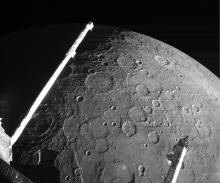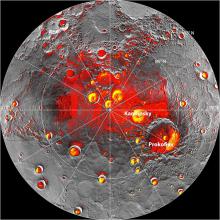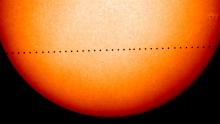Listen to today's episode of StarDate on the web the same day it airs in high-quality streaming audio without any extra ads or announcements. Choose a $8 one-month pass, or listen every day for a year for just $30.
You are here
Morning Mercury
Mercury is just peeking into the dawn sky now. But it stays quite low, so you need a clear horizon to see it — and binoculars wouldn’t hurt.
Mercury is the Sun’s closest and smallest major planet. And if people ever colonize the solar system, it probably won’t be a popular posting.
For one thing, it has no atmosphere, so you’d need spacesuits to get around. Temperatures at the equator can soar to 800 degrees Fahrenheit. And a day on Mercury lasts 176 Earth days. On average, that means you’d have three months of daylight followed by three months of darkness.
You’d be a lot older on Mercury, too. Mercury orbits the Sun four times for every orbit that Earth makes, giving it four “years” for every one on Earth. So your birthday cake would need four times as many candles. Of course, you’d also get four times as many cakes.
The extra cake wouldn’t add much to your weight, though; if you weigh 150 pounds on Earth, you’d weigh just 57 pounds on Mercury.
The best places to hang out on Mercury would be its poles. The bottoms of some craters at the poles never see the Sun, so they may contain big deposits of ice — a way to keep the punch cold for those frequent birthday parties.
Again, look for Mercury quite low in the east before sunrise. It looks like a fairly bright star, below brilliant Jupiter. It will get a little higher and brighter in the coming days, but will remain a tough target.
Script by Damond Benningfield





